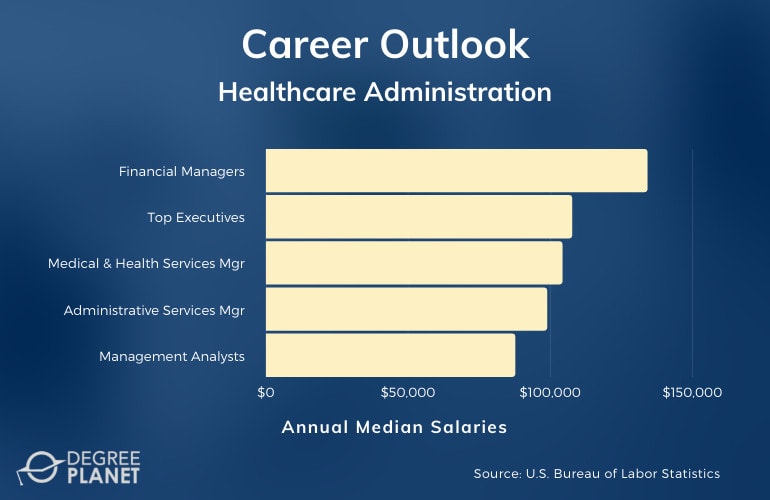Online MHA programs, or Master of Healthcare Administration programs, are often great options for those seeking to earn a master’s degree in healthcare.

Editorial Listing ShortCode:
Online master’s programs are often a convenient way to earn a graduate degree because it is usually easier to find one that fits your schedule, even when you have a full-time job and other responsibilities.
Online MHA Degrees
There are two types of master’s degrees for healthcare administration. If you’re interested in working in healthcare organizations, enjoy managing groups of people and overseeing business and financial matters, and can also manage stress well, you may be quite successful in either program.
While each one has its own particular strengths, they can both be excellent options for many students. They also share a few similarities.
For instance, graduates of both programs can often be found in health systems such as private medical offices or hospitals and are responsible for the supervision of managerial healthcare tasks.
Their job duties are typically similar as well, with both often being responsible for maintaining health informatics records, managing billing systems, assigning work schedules, and generally ensuring their hospitals, clinics, or offices run smoothly.
Master’s in Healthcare Administration

For a position in healthcare administration, you might want to pursue your Master of Healthcare Administration (MHA). If you are 100% sure you want to spend the entirety of your career in health systems, the MHA may give you more healthcare-specific training than a master’s in healthcare management.
While people in both professions have some level of interaction with patients, if you work in healthcare administration, you’ll likely spend most of your time overseeing the staff and meeting their needs as opposed to spending a lot of face-to-face time with patients.
If you work in a small clinic or office, you could potentially be responsible for overseeing an entire health systems facility. If you work in a large hospital, you’ll more likely be assigned to manage a single ward, floor, or department of the hospital instead.
Editorial Listing ShortCode:
In addition to assigning staff schedules, you’ll probably oversee the financial needs of your facility and the health informatics systems as well. This may include smaller tasks, such as making sure bills are paid on time, to larger financial responsibilities, like payroll, budgeting, purchasing, and grant writing. You’ll likely have to deal with cutbacks and rapidly evolving healthcare organizations regulations also.
Master’s in Healthcare Management

If you want to work in a supervisory capacity in a healthcare facility, your other option is to work towards your master’s in healthcare management. This degree is known as a Master of Business Administration (MBA) with a focus in Healthcare Management.
At its core, the MBA in Healthcare Management is a business degree. The focus of this degree is health services management, but it also provides a much broader education in the field of business.
Because of that, one of the largest benefits to earning this particular degree is that it may be used to find an administrative position in multiple fields or industries, not just health systems, which can be useful if you decide to switch careers later.
Editorial Listing ShortCode:
If you take this route and become a healthcare manager, you’ll likely still be responsible for many of the same duties as a healthcare administrator, but your role will probably be a bit broader. In essence, you’ll probably be focused less on the healthcare side of things and more on the business and human resource management aspects of healthcare leadership.
Responsibilities might include HR, general business concerns, organizational issues or problems, standards of patient care, and healthcare finance and budgeting.
Master’s in Healthcare Administration Curriculum & Courses

By the time you reach the graduate level of healthcare administration, you’ll probably have all your basic and foundational classes out of the way. Instead, you’ll likely focus on highly specialized, advanced courses, which may include any of the following classes.
- Fundamentals of Health Information Systems: This is an overview of health information management covering subjects such as the maintenance of patient records, data collection, HIPAA regulations, and electronic health informatics records in health systems.
- Health law and Policy: There are countless laws, regulations, and policies concerning both patients and healthcare organizations. This course teaches students all about federal, state, and local laws and policies and how to apply them to best serve and protect both patients and staff.
- Global Health and Diversity: This class examines healthcare on a global scale, including how different healthcare systems can be affected and influenced by politics, social factors, and financial matters.
- Organizational Development in Healthcare: In this class, students can learn about leadership, health services management, and organizational assessment while exploring the organizational hierarchy of the healthcare system.
- Finance in Healthcare: This class teaches students about all aspects of healthcare finance, with a focus on budgeting, purchasing, and how money is used in healthcare facilities.
- Strategic Human Resources Management: This is basically a course on building an effective human resources (HR) department. Students can learn about things like career development, employee training, recruitment, and project management.
- Strategic Healthcare Planning: This class discusses how to apply critical thinking skills to assess healthcare models, theories, and plans.
- Community Health Assessment: In this course, students use qualitative and quantitative research methods and data analysis to recognize, diagnose, and improve the health of various communities.
- Leadership in Healthcare: This course is specifically designed to help students become better leaders in the healthcare industry.
- Capstone: The capstone is pretty much par for the course in most master’s programs. It usually involves a semester-long personal project relevant to your major that is presented in front of a group of healthcare administration professionals and professors.
These are only a few of the most likely courses you might be required to take. Courses will vary depending on the program you take.
Healthcare Administration Careers & Salaries

Whether you earn your Master of Healthcare Administration or your Master of Business Administration in Healthcare Management, you’ll likely be able to pursue many of the same types of jobs in healthcare organizations. Most of these are mid-level and upper-level management positions with hospitals, state and private clinics, and private medical offices.
The MBA can help open up careers in other industries, but for this article, we’ll focus on careers within the health systems field.
According to the Bureau of Labor Statistics, these are some of the careers that you can pursue with either of these degrees:
| Careers | Annual Median Salaries |
| Financial Managers | $134,180 |
| Top Executives | $107,680 |
| Medical and Health Services Managers | $104,280 |
| Administrative Services and Facilities Managers | $98,890 |
| Management Analysts | $87,660 |
Even without adding in all the other industries that can potentially be moved into, the possible career opportunities for those with master’s degrees in healthcare administration are numerous.
Editorial Listing ShortCode:
Earning your master’s degree in this field could potentially lead to a very bright future for you.
MHA Specializations & Concentrations

Many master’s in healthcare administration programs offer a variety of different concentrations. If you choose to focus on one of these concentrations, you could possibly have access to some more specialized careers.
The following concentrations all fall under the umbrella of “healthcare administration.”
- Business Administration: This concentration involves many of the things learned in healthcare administration, such as supervising a team, running facilities, and collecting and organizing data in healthcare organizations, but can be applied to the business world at large.
- Finance and Economics: This concentration focuses on the financial side of healthcare administration, such as healthcare finance and health economics, and teaches how to cut costs in order to make healthcare more affordable for patients.
- Gerontology: This focus is specifically centered on the study of people age 65 and older. If you want to work in a nursing home or other elderly care facility, this may be an excellent concentration for you to take.
- Healthcare Informatics: This field encompasses both healthcare and technology and teaches how to use computers and other technology to perform essential healthcare services, such as health informatics record-keeping, digital file storage, patient analysis, and billing systems.
- International Management: This concentration focuses on healthcare all across the world and teaches how to analyze major themes, trends, and changes in global healthcare and manage complex business issues in healthcare using research gathered from international studies and models.
- Legal Issues in Healthcare: This specialization is designed to give a comprehensive education in health law, regulations, and the legal world. If you plan to work in a hospital’s or clinic’s legal department, this may be an excellent specialization for you to consider.
- Organizational Leadership and Change Management: This concentration is designed to prepare students for moving higher and higher up the ladder of healthcare administration, human resource management, and operations management professions.
- Population Health: This concentration focuses on the study of health within a specific community or population of people. It teaches how to target recurring and similar health conditions within groups of people living in the same general area, such as rural communities, prisons, or nursing homes.
All of these specializations can still help you gain the skills you need to work in the field of healthcare administration and shouldn’t lessen your chances of getting a job. You might even be able to branch out further into more specialized fields for additional career options if you streamline your focus, such as in healthcare finance or in health economics, for example.
Choosing an Online MHA Degree

When it comes to selecting a healthcare administration degree online program, you probably want to be as selective as possible. Any college program is a commitment, but this is especially true of a graduate-level program. There are several factors you may want to consider before choosing the program that’s the best for you.
- Cost: For just about everyone, the cost of college is a major factor in determining which school to attend. There are financial aid options out there that may help you pay for your college education, but you still don’t want to go too deeply into debt if you can help it. Setting a budget ahead of time and trying as much as possible to stick to it when choosing your school will help you keep from getting too far in debt. Factors such as whether the school is public or private and whether you will be charged in-state or out-of-state tuition will affect the total cost you’ll have to pay.
- Length of the program: Usually, a master’s degree takes somewhere between 2 and 3 years to earn after successfully completing a bachelor’s program. If you don’t want to spend that much time earning your degree, you can check to see if there is a school that has other options. Some colleges offer accelerated programs that allow students to finish faster. Others offer college credit for relevant work experience, which may cut down on the number of classes you have to take. There are also fast-track programs which are kind of a combination of both accelerated courses and credit-for-experience programs.
- Scheduling conflicts: With an online program, you shouldn’t have to worry nearly as much about working things into your schedule. There are some programs, though, that require campus visits or in-person workshops a few times a year. Getting these dates beforehand can help working professionals make sure they don’t conflict with their schedule.
Although these aren’t the only factors to consider, they are some of the most important ones for many students.
Admissions Requirements

Before enrolling in any program, it’s important to find out what its admissions requirements are. Graduate-level programs are a little more particular about their admissions processes, so it’s important you don’t miss anything.
- Application and personal essay: Most, if not all, schools will require you to fill out an application. For graduate schools, you’ll probably have to write an essay as well. You’ll likely need to include information about why you are interested in that particular program and why you think you’d be successful in it.
- Official transcripts: Graduate programs typically have fairly specific prerequisites you must meet before you can be accepted. This usually includes having a bachelor’s degree, but you may need certain prerequisite classes or a specific GPA as well. For that reason, colleges typically request that you submit copies of your official transcripts so they can make sure you meet all of the requirements.
- Letters of recommendation: Something that most graduate schools require that many undergraduate schools do not are letters of recommendation. Schools usually ask for one to three letters written by people who’ve known you professionally or in your educational past. These letters should tell the school why that person recommends you for the program and why he or she thinks you’d do well in it.
Editorial Listing ShortCode:
Additionally, you may be required to submit copies of standardized test scores, pay an application fee (or submit an official request that the fee be waived), and list any relevant work or internship experience you’ve had that would prepare you for the graduate program.
Accreditation

Another important factor to consider is your program’s accreditation status. Accreditation is usually listed on a school’s website. If you can’t find it, you can check the school’s status on the Department of Education’s website. The accreditation you want to look for is regional accreditation.
If your school is a regionally accredited institution, that means it’s been recognized by one of the seven regional accreditation agencies as adhering to the highest standards in teaching, resources, and curricula. Regional accreditation also means your credits are more easily transferred to other schools in the U.S.
Employers in the healthcare environment are also much more likely to accept your degree if it comes from a regionally accredited university. Some employers will also accept degrees from nationally accredited universities, but not all will.
You have no guarantees with national accreditation, especially outside a certain area. With regional accreditation, you can safely assume you got your money’s worth.
CAHME Accredited Online MHA Programs

For graduate-level healthcare administration programs, in particular, there is another type of accreditation that’s very important to have. It’s known as Commission on Accreditation of Healthcare Management Education (CAHME) accreditation.
In the United States or Canada, if you want to be more certain that your master’s level health services management degree is the best, you can go to a school with CAHME accreditation.
CAHME accreditation is a sign that the school’s healthcare administration program is high-quality and should give you a great education in the subject. CAHME accreditation isn’t stagnant either.
Being CAHME accredited means your school is constantly improving itself and setting itself to new and higher standards so that they’re always providing the most innovative and up-to-date education possible.

Schools that have been accredited by the Commission on Accreditation of Healthcare Management Education usually have exceptional professors, demanding and immersive curricula, and good resources. A high priority is typically put on flexibility and innovation as well.
CAHME accreditation ensures a program is constantly evolving and improving in order to meet the most rigorous standards put in place. Having a CAHME accredited degree program listed on your resume can help set you apart from applicants that came from schools without the certification.
This doesn’t mean you won’t be able to find a job in healthcare organizations if you attend a school without CAHME certification. It may simply be easier to find one if you do.
Healthcare Administration Professional Organizations

If you currently work in the healthcare or healthcare administration fields, you may already know about some of the professional organizations you can apply for membership in. If not, here are four popular ones.
- American Association of Healthcare Administrative Management: More commonly known as AAHAM, the American Association of Healthcare Administrative Management is an organization for health systems management professionals and other healthcare staff. It’s a place to network with other professionals in the field, attend AAHAM-sponsored events, and advance in your certifications.
- American Health Information Management Association: The AHIMA has over 100,000 members worldwide and is the go-to name in health information management. In addition to providing members with networking opportunities and professional development resources, AHIMA also sends out regular newsletters, holds conferences, and gives its members access to continuing education via the web.
- Association of Healthcare Administrative Professionals: The AHCAP is a non-profit association for healthcare administration professionals that offers members tuition assistance for continuing education, holds annual conferences, and hosts educational webinars.
- Healthcare Financial Management Association: The Healthcare Financial Management Association (HFMA) is a professional organization specifically for those in healthcare financial management. It provides members with certification opportunities, educational webinars, and career advancement opportunities.
All of these organizations can help provide you with excellent networking opportunities that may allow you to find new jobs or advance in your current organization. They also offer other benefits that make membership worthwhile for many healthcare professionals.
Healthcare Administration Licensing and Certification

If you’re going to work in the healthcare administration field, there are also some certifications and licenses you might want to get.
- Certified Healthcare Financial Professional: If your goal is to work in financial management, this can be a great certification to have because it helps prove you have mastery over financial planning and strategy, as well as strong business sense.
- Certified Healthcare Technology Specialist: This certification is earned through the AHIMA. It certifies you as an expert in health systems management, particularly as it relates to information technology systems.
- Certified Medical Manager: This is one of the most important certifications a healthcare manager can have. It certifies that you have comprehensive business knowledge of how to perform all necessary administrative duties in healthcare administration.
- Certified Professional in Healthcare Quality: This certifies you as a high-quality healthcare administrator and can help set you apart from other job applicants.
Each of these certifications may be a stepping stone to a higher-level career for you. They could potentially lead to more pay or give you an advantage over other applicants who don’t have the certifications.
Financial Aid & Scholarships

Once you hit the master’s level, you’re no longer eligible for a Federal Pell Grant, which is one of the most popular federal financial aid options for undergraduates. Luckily, there are still student loans and scholarships out there that may be able to help you.
You can apply for student loans basically anywhere that provides people with loans. You could also potentially get loans from the government by filling out the Free Application for Federal Student Aid (FAFSA). Loans have to be repaid no matter where you borrow them from, so it is important to make sure you check out the interest rates and repayment options before borrowing money.
Scholarships, fellowships, and grants are also popular options at the master’s level. You may be able to find scholarships, grants, or tuition assistance from professional organizations, your place of employment, or local groups and organizations.

There are also websites that contain comprehensive lists of scholarships and grants.
Your school may even offer scholarships to certain graduate students who show promise and demonstrate financial need. Some of the more innovative online programs may even allow you to work for the college as an online tutor or online teacher of undergrads to help offset the cost of your tuition.
Many hospitals and private clinics may also help pay your tuition if you agree to work for them for a set amount of time during or after college. There are all kinds of private and federal financial aid options to apply for. You just have to be willing to look for them.

How Does a Master of Health Administration Program Differ from a Master’s in Healthcare Management?
The main difference between the two is that a Master of Health Administration (MHA) is a dedicated health administration degree. The Master of Business (MBA) in Healthcare Management is more of a business degree with a focus on health systems management.
Editorial Listing ShortCode:
With the MBA, you could potentially work in business administration for a wide variety of different industries outside of healthcare if you wanted.
What Is the Best Online School for Healthcare Administration?

There isn’t one best online school for healthcare administration, but there may be a school that is the best for you. There are plenty of great online master’s programs out there. The trick is to find the health administration programs whose tuition and fees fit within your budget, have the accreditation and major you’re seeking, and fit your scheduling and any other needs you might have.
Which Is Better MBA or MHA Degree?
The answer to which degree is better depends entirely on you and what your plans for the future are.
If you’re absolutely certain your future lies in healthcare management or administration, you might consider enrolling in the MHA program because it’s more specialized and could give you more relevant information to the healthcare field.
If you know you want to work in business administration but aren’t sure which industry you want to work in, the MBA could potentially give you more career options beyond the field of healthcare. You might not get as many specific healthcare administration courses with this degree, though.
How Much Do MHA Online Programs Cost?

The price you’ll have to pay for your online MHA degree program will depend on several different things, including whether you’re an in-state or out-of-state student, whether your college is public or private, and other factors.
There are affordable options out there, especially for in-state students. Some in-state programs cost as little as $210 for each credit hour. Out-of-state students could potentially be required to pay up to $1,500 per credit hour, but that’s at the higher end of the spectrum. An average out-of-state student is usually charged about $600-$700 per credit hour.
Other schools, especially online schools, have a flat fee that doesn’t depend on your residency status. To figure out the specific tuition costs of a college, you can check out the college’s website and find out how much they charge per credit hour. You can multiply the cost per credit hour by the number of credits needed to earn the degree (which should also be on the website) to figure out the total tuition cost.
How Long Does It Take to Get a Masters in Healthcare Administration Online?

Depending on the specific program, master’s programs usually take about 2 to 3 years to earn. If you only take a class a semester, this time frame can be extended.
If you enroll in a fast-track or accelerated program, the time frame could be significantly shortened.
Are There Any Online MHA Programs No GRE Programs?
There are actually several schools out there offering online MHA degree program options that don’t require the GRE or GMAT in order to enroll in their master’s programs. They usually look at grades and GPA to determine if an application would do well.
Even some schools that do require the GRE will waive that requirement if your grades and GPA are high enough.
Are There Any CAHME Accredited Online MHA Programs?

There are some online MHA programs out there that are accredited by CAHME. Some of these are purely online programs, while others are online versions of on-campus MHA programs.
Editorial Listing ShortCode:
If you’re unsure whether an online MHA degree program has CAHME accreditation, you can check its website or email someone in the admissions department.
Are There Any 1 Year MHA Programs Online?
Finding an online MHA degree program you can complete in a year’s time is tough, but it’s by no means impossible. There are some 36 credit hour MHA programs that don’t require a thesis to graduate.
These can potentially be completed in a year’s time if you take a full course load each semester and remain continually enrolled throughout the entire year, including in the summer. It’s a fast-paced, heavy workload, but if you’re determined, you may be able to do it.
Are There Any MBA / MHA Dual Degree Programs Online?

There are a few online MBA/MHA dual degree programs out there. Not all of them are 100% online. Some may require you to come to campus a few times a year, but there are also a couple of 100% online dual degree programs as well. This is especially helpful for working professionals, who need to juggle work and school requirements.
Is Getting an MHA Online Worth it?
If you’re truly interested in working in the healthcare administration or healthcare management field, there are some jobs that can only be obtained by people with master’s degrees. An online master’s program may be an affordable and convenient way to earn your master’s degree from health administration programs.
All the reasons listed above may make an online masters in health administration worth it, especially if you can find one that fits both your schedule and your budget.
What Can You Do with an Online Masters in Healthcare Administration?

There are several jobs in a healthcare environment that you may be eligible for with a master’s degree in healthcare administration.
You might become a hospital administrator, nursing home director, director of operations, business consultant, financial manager, program director, or nursing director, just to name a few options.
Are There Any Accredited MHA Programs Online?
There are plenty of online MHA degree program options that have regional and/or CAHME accreditation.
You can find them by checking schools’ websites or by looking them up on the Department of Education’s website.
What Are the Benefits of Online MHA Programs?

Similar to online healthcare administration associates degrees and bachelor’s degrees, an MHA program can provide you with a comprehensive education in the things you need to know to work in hospital administration. It can also help you obtain a pretty good overview of the business administration field in general.
Many online MHA program options even have areas of concentration if you want to narrow your focus. You might choose something like Population Health, International Management, or Gerontology.
Are There Any Affordable Online Master’s Degrees in Healthcare Administration?
It might surprise you to know that there are actually quite a few online master’s degree MHA programs that are affordable. While most programs average somewhere around $200-$210 a credit hour, there are some online programs that cost quite a bit less than that.
If an online master’s degree program seems a little outside of your budget, you can look into financial aid options. There are all kinds of programs out there that may be able to provide tuition assistance.
Universities Offering Healthcare Administration Master’s Degree Programs
Methodology: The following school list is in alphabetical order. To be included, a college or university must be a regionally accredited institution and offer degree programs online or in a hybrid format.

A.T. Still University began in 1892 to educate students in health sciences. It was the first school of osteopathic studies. Today, it provides thousands of students’ with ways to earn master’s and doctorate degrees in a variety of health-related fields. Some of the study areas offered at A.T. Still include dentistry, physician assistant studies, and biomedical science.
- Master of Health Administration
A.T. Still University is accredited by the Higher Learning Commission.

Opened in 1906 as a school for children, Abilene Christian University now stands as a diverse Christian academy that accepts students from all backgrounds and seeks to aid them in obtaining a private, postsecondary education.
ACU has online and on-campus programs to assist learners in gaining undergraduate and graduate degrees in a wide range of studies.
- Master of Healthcare Administration
Abilene Christian University is accredited by the Southern Association of Colleges and Schools Commission on Colleges.

Located in the charming Blue Ridge Mountains, Appalachian State University has been offering a dynamic public education since 1889.
Those who seek an exciting campus life that is rich in school spirit and activities may be interested in looking into the many top-notch graduate and undergraduate programs offered at Appalachian State (U.S. News & World Report). ASU utilizes technology and research in all of its courses.
- Master of Health Administration
Appalachian State University is accredited by the Commission on Colleges of the Southern Association of Colleges and Schools.

Founded in 1930, Briar Cliff University is located just outside of Sioux City, Iowa. This academic institution gives students access to a private Catholic education but allows students from all denominations to enroll.
Offering pre-professional degrees and an assortment of bachelor’s and master’s degrees, Briar Cliff University strives to provide a rigorous academic experience for all who attend.
- Master of Health Administration
Briar Cliff University is accredited by the Higher Learning Commission.

Opened in 1973, City University of Seattle is a private, research-based school that helps students from all over the globe take part in its flexible campus-based and distance learning programs. CUS offers a variety of graduate and undergraduate degrees. Programs at CUS give students opportunities to explore career options by partnering with leaders in their respective industries.
- MS in Healthcare Administration
City University of Seattle is accredited by the Northwest Commission on Colleges and Universities.

Clarkson College has been serving students since 1888. Students at Clarkson College can pursue undergraduate, graduate, and post-graduate degrees in a variety of healthcare science programs.
Clarkson College trains students who wish to gain employment in health administration programs, imaging, billing, nursing, and more. There are also certificate programs offered at CC.
- Master’s in Health Care Administration
Clarkson College is accredited by the Higher Learning Commission.

Concordia University—Irvine, located in California, is part of the Concordia University family. It is a private, Lutheran school that was established in 1976. Today, CUI has a diverse population of students who attend both online and on campus.
CUI offers bachelor’s, graduate, and doctoral degrees in diverse areas of study, including seminary, science, business, and education.
- Master of Healthcare Administration
Concordia University Irvine is accredited by the WASC Senior College and University Commission.

Offering undergraduate, master’s, and doctoral degree programs, Drexel University has been dominating the world of private education since 1891. Drexel University allows students to study online and in-person while striving to give each student an innovative environment in which to thrive.
DU has many programs in fields such as healthcare, business, and science that reach students all over the world.
- Master of Health Administration
Drexel University is regionally accredited by the Middle States Commission on Higher Education.

Liberty University has made its name in education since 1771. It offers hundreds of academic disciplines that allow students to earn degrees that range from associate to post-graduate level education. Liberty adds faith-based aspects to its programs in order to aid students in becoming well-rounded, globally-minded citizens.
- MS in Healthcare Administration
Liberty University is accredited by the Southern Association of Colleges and Schools Commission on Colleges.

Mississippi College began providing spiritual-based, private education in 1826. MC offers degrees of all levels in a variety of academic areas. Popular degree fields at Mississippi College include law, healthcare, and education.
- Master of Health Services Administration
Mississippi College is accredited by the Southern Association of Colleges and Schools Commission on Colleges.

Pennsylvania State University World Campus is a public institution that opened in 1998. It provides ways for students worldwide to pursue associate, bachelor’s, and doctoral degrees in more than 100 areas of study. PSUWC is known for its military-friendly programs and rigorous academic profile.
- MHA in Health Policy and Administration
Pennsylvania State University is accredited by the Middle States Commission on Higher Education.

Regis University has been providing students with a private school education since 1927. With a variety of educational programs that lead to bachelor’s, master’s, and post-graduate degrees, RU works to provide active, hands-on experiences for both its online and on-campus students.
RU has programs in healthcare, business, technology, and more.
- MS in Health Services Administration
Regis University is accredited by the Higher Learning Commission.

Robert Morris University is a private academic facility in Pittsburgh, PA, that opened in 1921 as a school for accountancy. Today, it has more than 80 graduate and undergraduate degree programs. RMU also offers a variety of professional certifications for students looking to advance in their careers and is known nationally for its award-winning programs.
- MS in Health Services Administration
Robert Morris University is accredited by the Middle States Commission on Higher Education.

Saint Joseph’s College of Maine is a private liberal arts institution that provides students with opportunities to earn bachelor’s and graduate degrees in an assortment of academic fields. It is a faith-based college but accepts students from all religious backgrounds.
SJCM offers online program options for its students.
- Master of Health Administration
Saint Joseph’s College is accredited by the New England Commission of Higher Education.

Saint Joseph’s University is a private, Jesuit college that started in 1851 to aid adults in earning higher education degrees.
Over time, Saint Joseph’s University has grown to reach new levels in providing programs that are full of innovation and technology. SJU offers students access to bachelor’s, master’s, and doctorate degree programs on campus and through virtual learning.
- MS in Health Administration
Saint Joseph’s University is accredited by the Middle States Association of Colleges and Schools.

Offering an array of degree programs that range from bachelor’s to doctoral, Samford University has been a leader in Alabama’s education sector since it began in 1841. This private institution enrolls more than 5,000 students every year and serves students across the nation and in 28 countries around the world.
- Master of Healthcare Administration
Samford is accredited by the Commission on Colleges of the Southern Association of Colleges and Schools.

Seton Hall University is a global leader in private education and has been leading the way since opening in 1856. Its extensive program choices allow students to pursue undergraduate, master’s, and doctoral degrees. Its programs are designed to help students develop essential career skills and personal insight. Classes at SHU are offered online and on campus.
- Master of Healthcare Administration
Seton Hall University is accredited by the Middle States Association of Colleges and Schools.

The University of Central Florida opened in 1963 with the intent to plunge into space exploration and other science-based areas.
This public university has expanded to have an array of academic programs in which students can earn bachelor’s, master’s, and higher-level degrees. Students are encouraged to participate in internships and research opportunities.
- Executive Master of Health Administration
The University of Central Florida is accredited by the Southern Association of Colleges and Schools Commission on Colleges.

Created with the mindset of bringing public education to all adults, the University of Cincinnati began in 1819. Over time, the University of Cincinnati has grown into a globally recognized research facility that offers graduate and undergrad degrees in areas such as education, business, science, and healthcare. Programs are offered online and on campus.
- Master of Health Administration
The University of Cincinnati is accredited by the Higher Learning Commission.

The University of Mary began in 1959. It provides education to students of all belief systems who desire to achieve a degree with a spiritual perspective. UM strives to assist students in their professional growth by instilling an attitude of respect and the importance of social justice into each of its doctoral, master’s, and bachelor’s degree programs.
- MBA in Healthcare
The University of Mary is accredited by the Higher Learning Commission.

Opened in 1789, the University of North Carolina at Chapel Hill is an internationally recognized public college that strives to instill leadership qualities and critical thinking skills into each of its students. Deeply rooted in research and technology, UNC-Chapel Hill helps students acquire undergraduate, master’s, and doctoral degrees in a variety of fields.
- Master’s in Health Administration – Public Health Policy
The University of North Carolina at Chapel Hill is accredited and/or recognized by the Southern Association of Colleges and Schools Commission on Colleges.

The University of Saint Francis started in 1890 as a private, Catholic college. Today, it enrolls over 2,000 students annually in its undergraduate and master’s programs. Popular areas of study at the University of Saint Francis include business, liberal arts, creative arts, and health sciences.
Some students have the opportunity to get paid work as course credit in USF’s EPIC program.
- Master of Healthcare Administration
The University of Saint Francis is accredited by the Higher Learning Commission.

Located in the dynamic city of Los Angeles, the University of Southern California began in 1880 and is the oldest private school in California. USC is a leading research university and serves more than 50,000 students annually. It awards bachelor’s, master’s, and doctoral degrees in more than 200 areas of study.
USC also provides the most jobs of any private institution in LA.
- Executive Master of Health Administration
The University of Southern California is accredited by the Western Association of Schools and Colleges and the Senior College and University Commission.

Founded in 1888, the University of Scranton is a private college with a Jesuit foundation. The US has more than sixty bachelor programs to help students reach their personal and academic potential.
Those who are inspired to go further can choose from over thirty master’s programs that are designed to challenge the mind and lead to a more profound understanding of core content.
- Master of Health Administration
The University of Scranton is accredited by the Middle States Commission on Higher Education.

Virginia Commonwealth University started in 1838 as part of the medical division of another college. Throughout the years, VCU has expanded into a renowned public facility that uses research and critical thinking to explore ways to better the world.
Students who want a 21st-century option to gain an undergraduate or graduate degree may want to explore VCU.
- MS in Health Administration
VCU is accredited by the Southern Association of Colleges and Schools Commission on Colleges.
Getting Your Master’s in Healthcare Administration Degree Online

If you’re interested in moving up the ladder in healthcare administration or healthcare management, earning your master’s degree in a healthcare administration or management field may be a great option for you.
Enrolling in a master’s program can feel like a huge commitment, but it doesn’t have to take up all of your time or all of your money.
There are some reasonably priced MHA and MBA in Healthcare Management programs out there, and being able to earn your master’s degree in an online MHA program has made earning the degree as convenient as possible.
Whether you’re hoping to become a hospital administrator, nursing home director, financial manager, or something similar, earning your master’s degree may be the best first step you could take. You can start looking for an on-campus or online MHA degree program to enroll in today!

